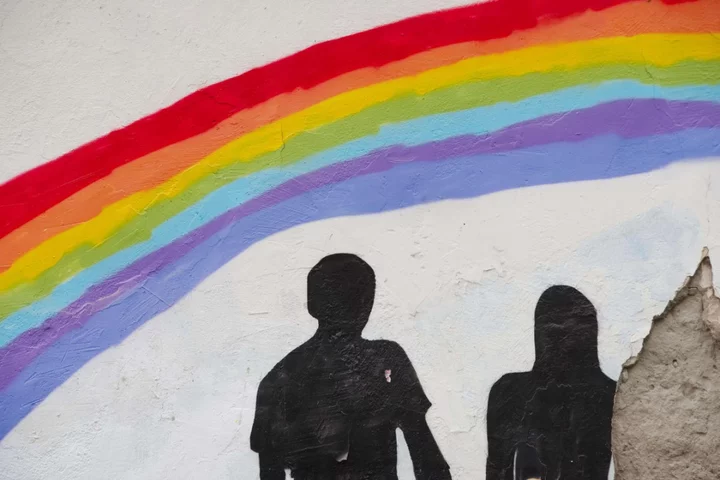Young LGBT+ people who weren’t supported at home and school are more than twice as likely to have had suicidal thoughts and feelings than supported peers, a new report has found. Those from unsupportive backgrounds are also nearly twice as likely to have self-harmed, nearly half as likely to say they are happy in adulthood (43% vs 85%), and more than three times as likely to ‘never or rarely’ feel optimistic about their future – according to the findings from Just Like Us. The LGBT+ young people’s charity surveyed 3,695 people aged 18-25, including 1,736 LGBT+ young adults from across the UK. The ‘Positive Futures‘ report also found unsupported young LGBT+ people were significantly more likely to have experienced panic attacks and depression. What does an ‘unsupportive background’ mean? “An unsupportive time growing up can look like being bullied at school, never hearing that it’s OK to be LGBT+, facing family rejection and even estrangement, and not having any role models to look up to – all simply because you are LGBT+,” Amy Ashenden, Just Like Us interim CEO, told PA Media. “Sadly for lots of LGBT+ young people today, that remains a really gruelling reality. When we look at the research findings, we can see it’d be foolish to think growing up LGBT+ is not still incredibly tough.” How can you help support young LGBT+ people? Ashenden added: “Anyone who cares for and about young people has a role to play – whether or not you think they might come out as LGBT+ one day. We are calling particularly on parents, guardians and teachers to be more vocal in their support for LGBT+ people from the outset. “From the research, we know that LGBT+ young people wish they’d had these conversations from nursery age, which simply looks like saying: LGBT+ people exist and I support them. I’m proud to be an ally. “As a parent, you could mention a TV character or a person you know who is LGBT+ and you could mention how you admire their courage to be out and proud, or talk to them about how they are free to be who they are, different gender expressions included, and that you don’t agree with the harmful things sometimes said about trans people,” Ashenden said. Listening without judgement If a young person tells you they’re worried about coming out as LGBT+ and you’re unsure how to respond, remember there can be great value in just being a supportive listener. “The most important thing when a young person feels vulnerable or scared about coming out is providing a safe and supportive environment for that person to share their feelings, and to help them overcome their anxieties,” said Robert Common, an LGBT psychotherapist and founder/group CEO of The Beekeeper House. “Your role is to listen, and to allow them to express themselves without fear of judgement. You don’t need to be there to offer solutions – and be mindful of giving advice you’re not sure will be helpful or effective. You should remind them that they aren’t alone; there are many support groups and resources out there to help them.” Common added that ‘coming out’ isn’t just one conversation, either. For some young people, there may be anxiety about whether they will be accepted. “There’s a misconception that coming out is one big momentous point in time, but in reality, it’s a process. Although it shouldn’t be this way, the journey of acceptance can take a long time for some individuals, including family,” Common explained. “Young people in this situation should know that they should always come out on their own terms, whilst prioritising their safety and wellbeing. “If they do feel at risk from coming out to family, [gently encourage] them to talk through what the risks might look like and how to make contingency plans if they are faced with any kind of negative reaction or discrimination.” Signposting and community If a young LGBT+ person needs support and is facing difficulties, there are organisations that can help. Signposting them towards these can be a helpful step. For example, Common suggested: “The Albert Kennedy Trust (akt.org.uk), for LGBT young people who are homeless or living in a hostile environment. They can help with finding emergency accommodation as well as employment, education and training for those who need to support themselves.” Finding community can also be helpful – and “crucial for individuals that feel isolated or alone”, Common added. “The LGBTQ+ community is diverse, so when speaking to someone coming out, you can encourage them to see which parts of that community they identify with and relate to the most.” Many mental health charities like Mind (mind.org.uk) also offer specific advice for LGBTQ+ people, and the LGBT+ anti-abuse charity Galop (galop.org.uk) can provide support to those who have experienced violence or abuse. Read More Charity boss speaks out over ‘traumatic’ encounter with royal aide Ukraine war’s heaviest fight rages in east - follow live As Pride Month begins: 5 LGBTQ+ icons who have helped shape pop culture and history 10 ways to explain dementia to children How to make your home summer ready
Young LGBT+ people who weren’t supported at home and school are more than twice as likely to have had suicidal thoughts and feelings than supported peers, a new report has found.
Those from unsupportive backgrounds are also nearly twice as likely to have self-harmed, nearly half as likely to say they are happy in adulthood (43% vs 85%), and more than three times as likely to ‘never or rarely’ feel optimistic about their future – according to the findings from Just Like Us.
The LGBT+ young people’s charity surveyed 3,695 people aged 18-25, including 1,736 LGBT+ young adults from across the UK. The ‘Positive Futures‘ report also found unsupported young LGBT+ people were significantly more likely to have experienced panic attacks and depression.
What does an ‘unsupportive background’ mean?
“An unsupportive time growing up can look like being bullied at school, never hearing that it’s OK to be LGBT+, facing family rejection and even estrangement, and not having any role models to look up to – all simply because you are LGBT+,” Amy Ashenden, Just Like Us interim CEO, told PA Media.
“Sadly for lots of LGBT+ young people today, that remains a really gruelling reality. When we look at the research findings, we can see it’d be foolish to think growing up LGBT+ is not still incredibly tough.”
How can you help support young LGBT+ people?
Ashenden added: “Anyone who cares for and about young people has a role to play – whether or not you think they might come out as LGBT+ one day. We are calling particularly on parents, guardians and teachers to be more vocal in their support for LGBT+ people from the outset.
“From the research, we know that LGBT+ young people wish they’d had these conversations from nursery age, which simply looks like saying: LGBT+ people exist and I support them. I’m proud to be an ally.
“As a parent, you could mention a TV character or a person you know who is LGBT+ and you could mention how you admire their courage to be out and proud, or talk to them about how they are free to be who they are, different gender expressions included, and that you don’t agree with the harmful things sometimes said about trans people,” Ashenden said.
Listening without judgement
If a young person tells you they’re worried about coming out as LGBT+ and you’re unsure how to respond, remember there can be great value in just being a supportive listener.
“The most important thing when a young person feels vulnerable or scared about coming out is providing a safe and supportive environment for that person to share their feelings, and to help them overcome their anxieties,” said Robert Common, an LGBT psychotherapist and founder/group CEO of The Beekeeper House.
“Your role is to listen, and to allow them to express themselves without fear of judgement. You don’t need to be there to offer solutions – and be mindful of giving advice you’re not sure will be helpful or effective. You should remind them that they aren’t alone; there are many support groups and resources out there to help them.”
Common added that ‘coming out’ isn’t just one conversation, either. For some young people, there may be anxiety about whether they will be accepted.
“There’s a misconception that coming out is one big momentous point in time, but in reality, it’s a process. Although it shouldn’t be this way, the journey of acceptance can take a long time for some individuals, including family,” Common explained. “Young people in this situation should know that they should always come out on their own terms, whilst prioritising their safety and wellbeing.
“If they do feel at risk from coming out to family, [gently encourage] them to talk through what the risks might look like and how to make contingency plans if they are faced with any kind of negative reaction or discrimination.”
Signposting and community
If a young LGBT+ person needs support and is facing difficulties, there are organisations that can help. Signposting them towards these can be a helpful step.
For example, Common suggested: “The Albert Kennedy Trust (akt.org.uk), for LGBT young people who are homeless or living in a hostile environment. They can help with finding emergency accommodation as well as employment, education and training for those who need to support themselves.”
Finding community can also be helpful – and “crucial for individuals that feel isolated or alone”, Common added.
“The LGBTQ+ community is diverse, so when speaking to someone coming out, you can encourage them to see which parts of that community they identify with and relate to the most.”
Many mental health charities like Mind (mind.org.uk) also offer specific advice for LGBTQ+ people, and the LGBT+ anti-abuse charity Galop (galop.org.uk) can provide support to those who have experienced violence or abuse.
Read More
Charity boss speaks out over ‘traumatic’ encounter with royal aide
Ukraine war’s heaviest fight rages in east - follow live
As Pride Month begins: 5 LGBTQ+ icons who have helped shape pop culture and history
10 ways to explain dementia to children
How to make your home summer ready









